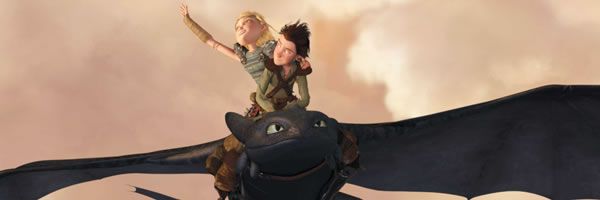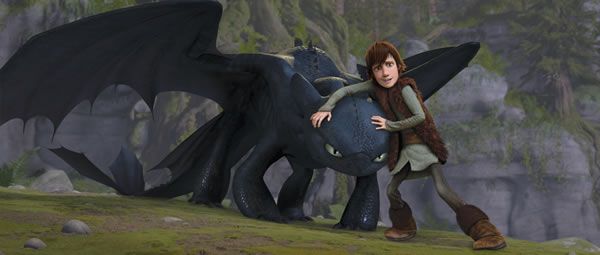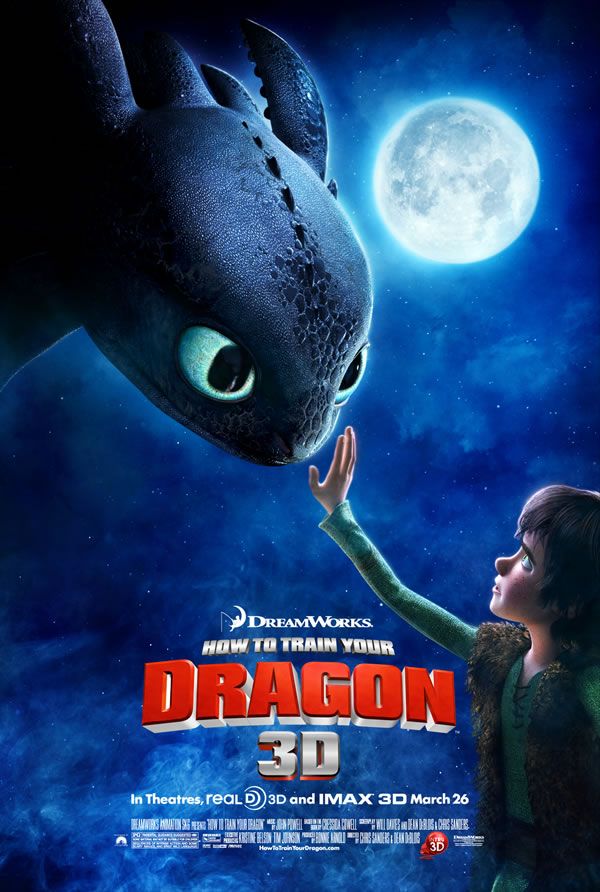How to Train Your Dragon is by far the best DreamWorks Animation film to date. I don't know if it will be their highest grossing (probably not because it doesn't have "Shrek" in the title) or if it will sell the most toys (the main dragon is pretty darn cute), but it's easily the best movie I've seen from the company. I find too often that their films rely on getting the most famous celebrities as the voices and having most the jokes be puns or pop-culture references. How to Train Your Dragon tells the simple boy-and-his-dragon story and then carries you away with likable characters and exhilarating action.
Hiccup (Jay Baruchel) is not a popular Viking. He's scrawny, he's nerdy (he has a knack for invention), and he's so clumsy that he gets in the way of how most of his fellow Vikings spend their time: fighting dragons. To make matters worse, Hiccup's father Stoick (Gerard Butler) is the chief of the village and the best dragon-slayer around. In an effort to prove himself to everyone, Hiccup uses a bola-catapult to bring down a dragon, but no one sees it. He sets off to find the felled dragon only to discover it's still alive, but captured in the ropes of the bola. Unable to bring himself to kill the creature, Hiccup begins training the dragon-who he names "Toothless" due to the dragon's retractable teeth-and discovers that they're not the violent predators they're made out to be by Viking lore.
Anyone who's ever owned a pet has laid their heart-strings bare for a movie like this. It's not only that we care for a pet, but that pet in turn cares for us. They teach us about our own humanity. This was done best in one of my all-time favorite movies, The Iron Giant. How to Train Your Dragon doesn't reach that lofty height of quality, but it's moving in the same way. It also has a strong moral lesson about how it's more courageous to be kind than to be violent. When Hiccup is put into dragon-slayer training, he's unable to fight them hand-to-hand, but he learns, through his time with Toothless, that non-violent approaches are more effective than the physical training required in bringing down a dragon. Naturally, Hiccup isn't too eager to reveal his secret as his village, and especially his father, are hung up on the "dragons-must-be-killed" thing.
It's the kind of generational divide you can see repeated throughout history. Where conflict has been established by the older generation (who in this film all speak with Scottish accent even though their kids don't), it's the younger generation who learn that the only way to bring peace is to reexamine the nature of the conflict and then try to resolve it non-violently. Violence perpetuates violence. These lessons of "courageous kindness" and "violence-begets violence" may seem corny, but Dragon makes it work. The lessons are subtext that kids will pick up on by seeing how the characters behave and that adults should appreciate because it makes the film more than the sugar cereal of most animated films.
However, the film is never preachy and always remembers to be fun. And How to Train Your Dragon is a lot of fun. The voice actors all provide great performances that always keep pace with both the humor and the range of the characters' emotions. But where Dragon really shines is in the flying scenes. This will probably piss off Avatar fanboys, but I don't care: this is how you film flight in 3D. The direction of the whole movie is tremendous, but when it comes to Hiccup and Toothless soaring through the sky, it shows you 3D at its best. The depth is measured perfectly with the editing so that you feel like you're flying with the character. You're sharing Hiccup's joy rather than just witnessing it.
I wish all of DreamWorks Animation's movies were as good as How to Train Your Dragon. It's the best kind of 3D film: one where the 3D contributes to the experience, but the movie can stand on its own without it. The movie deserves special credit for its ending, which is a kind most other family films would be terrified to make. It's an ending that's yet another example of how co-writers and directors Dean DeBlois and Chris Sanders trusted their talent and their audience and as a result created a film that soars.
Rating: A




